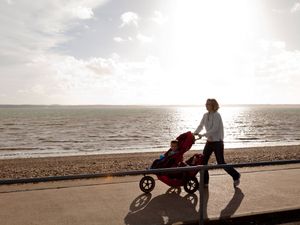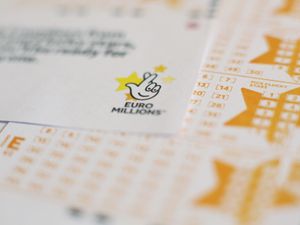New mothers ‘should do two hours of moderate to vigorous exercise every week’
Experts say women can reap physical and mental health benefits from trying to fit in exercise.

New mothers should aim for two hours of moderate to vigorous exercise every week, such as brisk walking or cycling, researchers say.
Getting back to exercise in the first 12 weeks after birth will help boost both physical and mental health and improve sleep, according to a study.
After looking at existing research, experts produced a “strong recommendation” for new mothers to spend at least 120 minutes a week doing such exercise, spread over four or more days of the week.
This should incorporate a variety of aerobic and resistance training, they said.
Resistance training includes things such as using gym machines or doing exercises including sit ups, squats, push ups, leg raises and planks.
Writing in the British Journal of Sports Medicine, the new guidance from the Canadian Society for Exercise Physiology also “strongly” recommends women do daily pelvic floor muscle training to reduce the risk of urinary incontinence.
Women should also try their best to develop a healthy sleep routine (such as avoiding screen time and maintaining a dark, quiet environment before bed) to support their mental health.
The Canadian researchers said: “Beginning or returning to MVPA (moderate to vigorous physical activity) in the first 12 weeks following childbirth, and better quality sleep, are associated with improved mental health.
“Postpartum women and people who follow this guideline for physical activity, sedentary behaviour and sleep will likely experience a large improvement in their psychological wellbeing (ie reduction in the prevalence of depression, symptoms of depression and anxiety); pelvic floor health (ie reduction in the risk of urinary incontinence); musculoskeletal health (ie reduction in low back and pelvic girdle pain symptoms and severity); cardiometabolic health (ie improvement in weight, body mass index and blood lipids); and a reduction in fatigue, while not experiencing adverse effects (eg reduced breastmilk supply or injury).”
The team said returning to running and resistance training is generally safe once a woman is healed from their baby’s birth, including Caesarean section.
They added: “It is essential to acknowledge that infant feeding and care significantly impacts daily life, including sleep, thus these recommendations may not always be achievable, and at times specific recommendations within this guideline will not align with current circumstances.”
However, the team said “any progress – even if small – in meeting physical activity targets can improve maternal physical and mental health, and any reductions in sedentary behaviour may improve cardiometabolic health.”
Justine Roberts, founder and chief executive of Mumsnet, said: “Clear, evidence-based guidance on postpartum exercise is long overdue, and it’s encouraging to see recommendations that prioritise the wellbeing of new mothers, even if some of them seem wildly optimistic about what looking after a newborn entails.
“As Mumsnet users will attest, ‘developing a healthy sleep routine’ is much easier said than done.
“However, it’s crucial that this guidance doesn’t become yet another stick to beat new mums with.
“Many of them are already stretched to their limits, and advice like this isn’t always helpful if you don’t have the practical means to follow it.”
For the study, experts looked at 574 lots of research and how these related to reduced breast milk quality or quantity, depression and anxiety, urinary incontinence, fear of movement, fatigue, injury, and poor infant growth and development.





